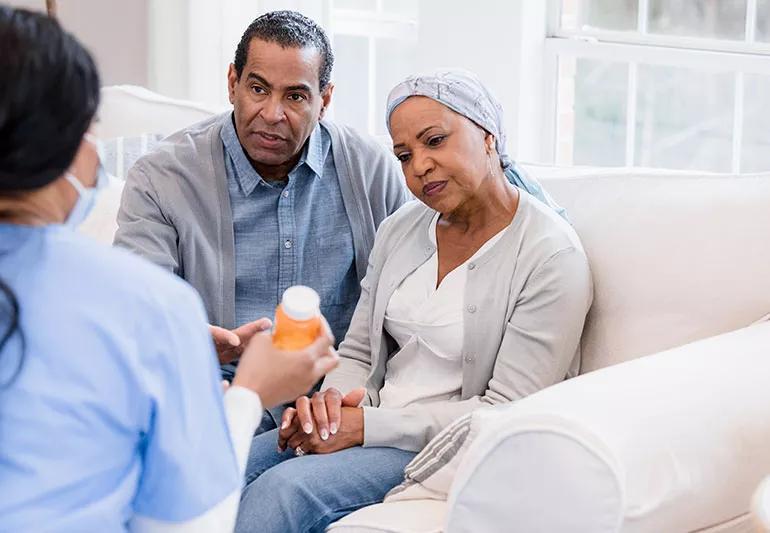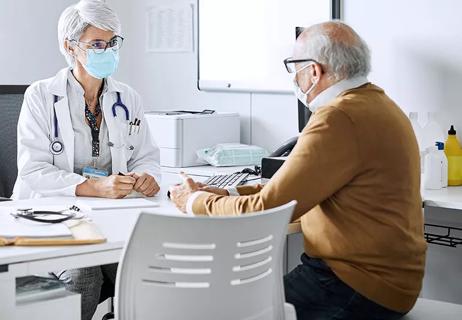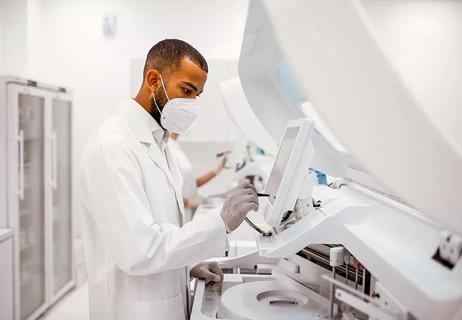You may experience fatigue, weight loss, nausea and diarrhea, but exercise and medication can help

If you’ve been diagnosed with cholangiocarcinoma (or bile duct cancer), you may have no symptoms or may have been experiencing symptoms like abdominal pain, fatigue, unexplained weight loss and digestive upset. Often, these are the symptoms that led you to seek medical care.
Advertisement
Cleveland Clinic is a non-profit academic medical center. Advertising on our site helps support our mission. We do not endorse non-Cleveland Clinic products or services. Policy
The kind of treatment you’ll receive depends on your diagnosis, the location of the cancer and if it’s spread. And each form of treatment comes with its own set of potential side effects and benefits.
Gastrointestinal care coordinator Julie Krause, BSN, RN, discusses the different treatment options and provides advice on how to manage side effects.
“Cholangiocarcinoma treatment is a team sport,” says Krause.
In addition to a surgical lineup, medical oncologist and radiation oncologist, you may be referred to a gastroenterology specialist, interventional radiology specialist — who performs procedures to open clogged bile ducts — and a palliative medicine specialist to help manage side effects.
It’s important to understand what side effects you may experience during each kind of treatment and when those symptoms may start. Some can be cyclical, starting after treatment and resolving a few days later, while others begin later in the process and resolve after treatment is complete.
“Before you start on any treatment, you’ll have an education session where we talk with you about what to expect from your treatment,” explains Krause. “We discuss what the common side effects are, and what you can do to manage them.”
Advertisement
If your bile duct cancer is caught early and hasn’t spread, your doctor may suggest surgery.
Options can include removing parts of your bile duct or the entire tube. A Whipple procedure removes your bile duct, gallbladder and parts of your pancreas, stomach and small intestine. A palliative surgery removes blockages in your bile duct to help relieve symptoms but doesn’t typically remove all the cancer.
“With surgery, you’re going need time to heal,” says Krause. “Eating well and getting moving after surgery help your body recover. Surgical symptoms typically get better as you heal.”
Your incision may be closed with stitches, staples, glue or Steri-Strips. It’s important you keep the area clean and always wash your hands before touching that area. There may be restrictions on how many pounds you can lift or when you can drive a car.
Your doctor may recommend a special diet after surgery to gauge how your digestive system handles food. Diet can usually be expanded as tolerated.
Your doctor may suggest chemotherapy to destroy cancer cells.
Chemo pills may be recommended after surgery to reduce the chance of cancer coming back. If the cancer has spread, or comes back after surgery, chemotherapy infusions may be needed.
A common side effect of chemotherapy is nausea. Your doctor typically will provide you with medication to help alleviate this symptom.
“Eating frequently also helps nausea,” says Krause. “Eating every couple of hours helps maintain nutrition and prevents feeling over-full.”
Certain kinds of chemotherapy may also cause diarrhea or constipation.
To help with those side effects, Krause says your care team will usually recommend medication and diet changes.
“For the anti-diarrheal pills, we will go over how to take it so that it doesn’t stop all your bowel movements to the point that you’re constipated,” she adds. “It’s all about balance.”
If you’re given chemotherapy pills, there’s a chance you may develop mouth sores.
“If you have mouth sores, we recommend starting with a baking soda and salt rinse,” says Krause. “You can do this three to four times a day.”
Avoid anything that can be irritating to your mouth like whitening toothpaste, spicy foods and hard or sharp foods.
Immunotherapy is used to help your own immune system fight cancer cells. This type of treatment is given as an infusion and may be used with chemotherapy.
“Immunotherapy isn’t chemotherapy,” notes Krause. “Immunotherapy teaches your body to recognize foreign cells so that it can treat them like it would any bad cell in the body.”
Advertisement
While most side effects of immunotherapy are mild, there’s a small chance it can cause inflammation. Symptoms depend on the area affected and may only be noticed on a blood test.
“Inflammation can happen in any organ, and what people experience depends on the organ affected,” explains Krause. “For example, if your lungs become inflamed, you may develop a cough. If your intestines are inflamed, you may have diarrhea.”
This typically happens because your immune system is in “overdrive.” Your doctor may recommend steroid medication to help reverse symptoms.
Radiation therapy may be recommended after surgery to kill any remaining cancer cells. Radiation can also be used to control symptoms of cancer. Radiation may be combined with chemo pills in some situations.
Radiation therapy uses a machine that aims beams of radiation through your skin at the area of the tumor. This can cause the skin where you receive radiation to become irritated. Symptoms depend on the location and duration of treatment.
“It’s can be like a sunburn on the outside of your body, but also inside your body,” says Krause. “So, eating and drinking may be uncomfortable and you may experience nausea.
“Your care team will recommend gentle skin care and a moisturizing routine.”
Advertisement
Going through treatment for bile duct cancer can be daunting and exhausting. Most hospitals have established care teams to help manage your side effects and support you and your caregivers through treatment.
Here are some other tips Krause recommends to manage your side effects:
Advertisement
Overall, the side effects of bile duct cancer treatments can be managed. But the best advice for people going through treatment for bile duct cancer? “Don’t suffer in silence,” stresses Krause. “Tell your care team what you’re experiencing. There are many resources to help you feel as well as possible at every phase of your cancer journey.”
Learn more about our editorial process.
Advertisement

There are many options, including surgery or medication

Biomarker testing tells doctors how to target their treatments

Rely on trusted information from hospital systems, medical nonprofits or your oncologist

A decreased appetite can cause weight loss, so opt for smaller meals and full-fat foods

Thoughts and feelings can change over time; relaxation, self-care and support groups can help

Your care team can help you manage the side effects of surgery, chemo and radiation — but you have to let them know what you’re experiencing

Dehydration, medication and nasal congestion are common culprits

Up to 30% of people who take the cholesterol-lowering medication feel aches and soreness

The tropical fruit is a good source of antioxidants and vitamin C

Most people fall asleep within 10 to 20 minutes, but if your experience is different, adjusting your sleep schedule may help

Exploring your hidden side can lead to better understanding of what makes you tick